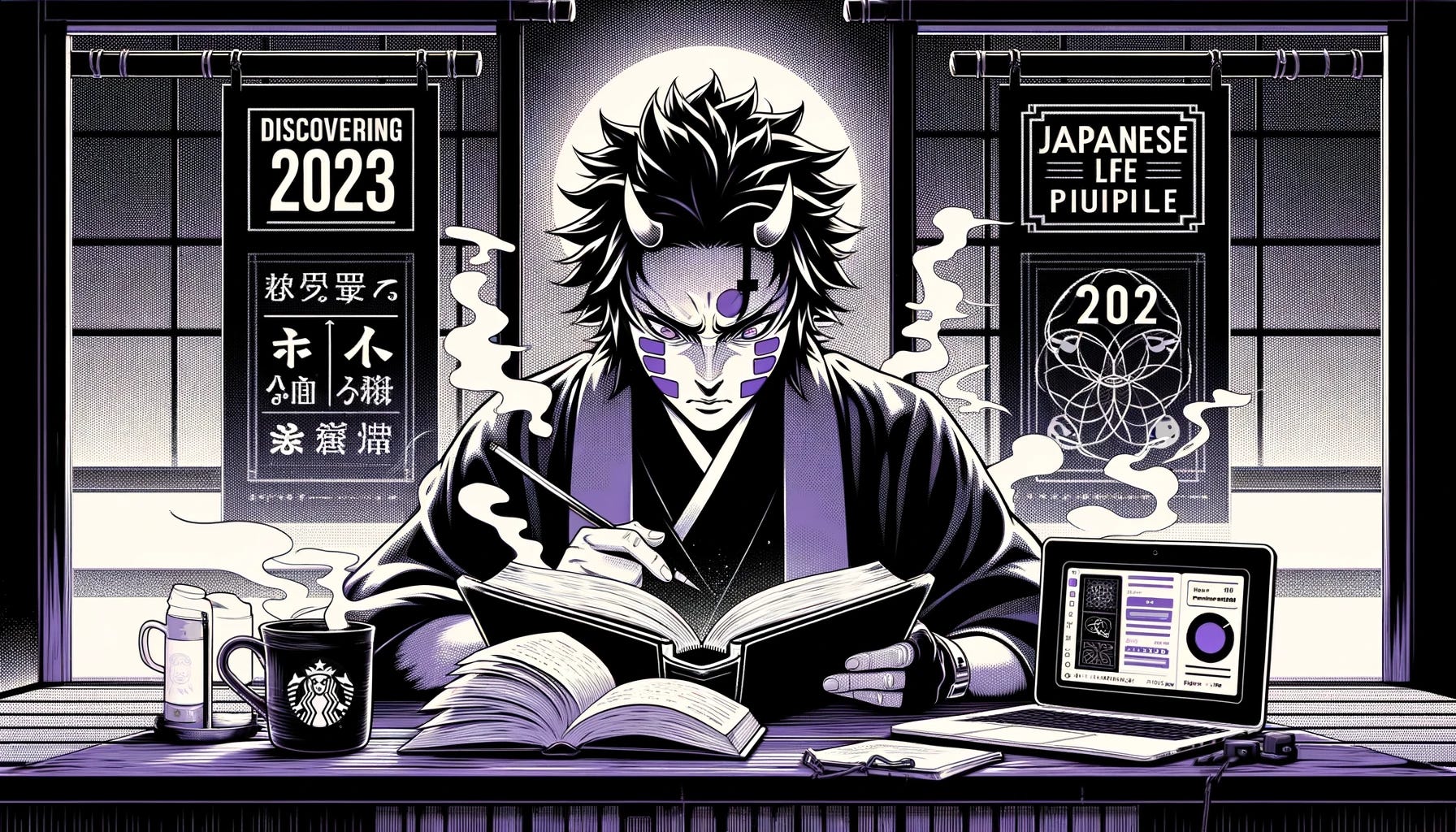Discovering Ikigai: 23 Japanese Life Principles to Kickoff Your 2023 with Purpose, Growth, and Fulfillment
Discover how traditional Japanese principles can enrich your life, work, and relationships in a meaningful yet practical way
Hey everyone,
I hope you're all starting the new year off well! My girlfriend and I recently took a trip to her hometown of Tokyo, Japan to meet her parents and celebrate the New Year, a long-standing tradition in Japan.
During our trip, I had the unique opportunity to be immersed in her family's traditions and lifestyle. We visited a traditional Japanese onsen ryokan in Hakone, toured ancient castles and temples, and even participated in incense, tea-making ceremonies, and traditional calligraphy sessions hosted by her wonderful oba-chan (aka grandma). It was a truly unique and enriching experience to end the year with.
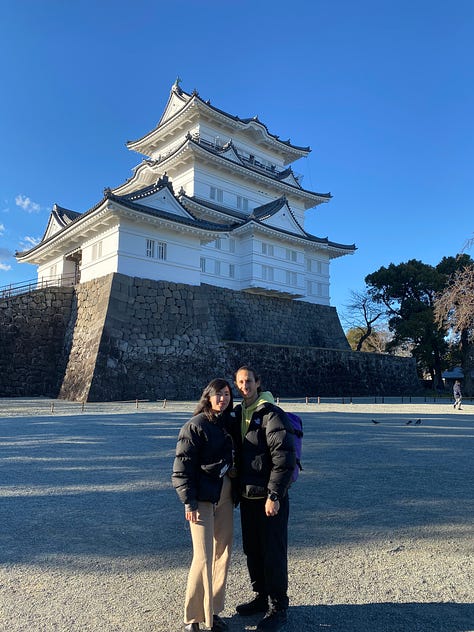
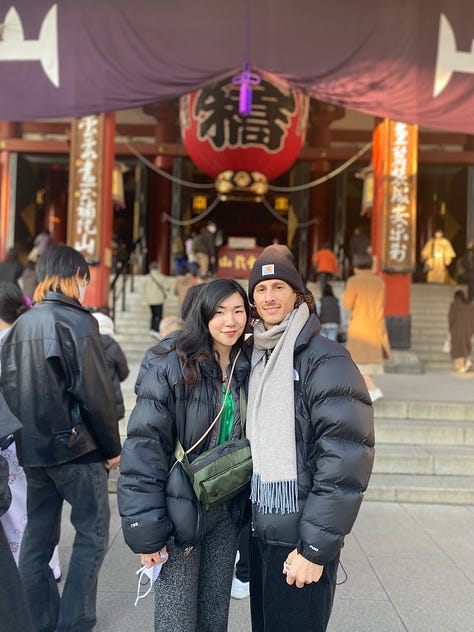
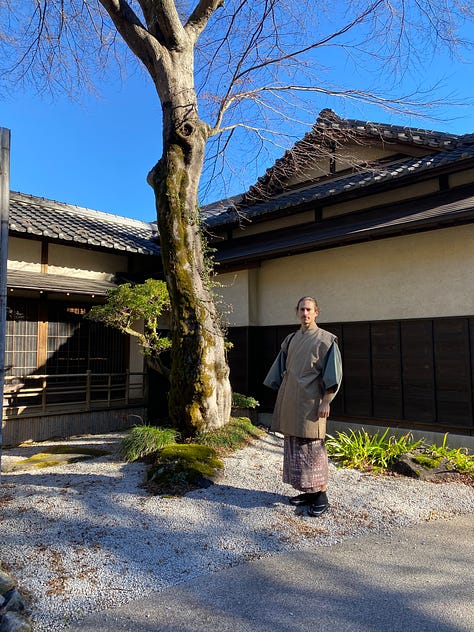
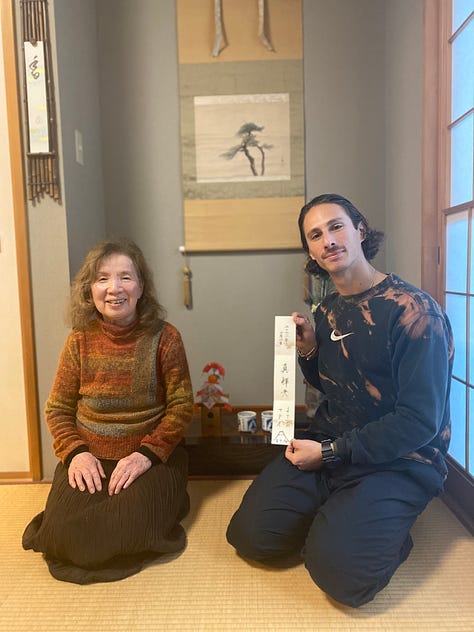
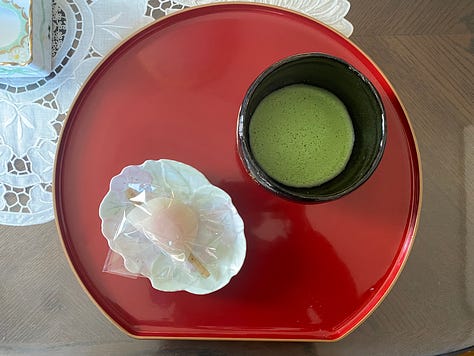
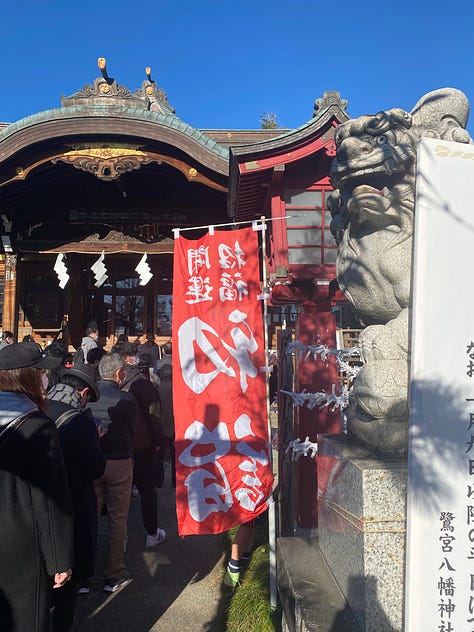
One thing that really stood out to me during our trip was the depth and richness of the traditional Japanese life principles known as ikigai. These tenets are so widely embraced to this day because they:
Provide a practical framework for finding purpose and meaning in life, and approaching challenges with a positive and constructive mindset.
They encourage you to cultivate balance and harmony in work and life, cultivate mental and emotional resilience, smooth the edges of your character, and embrace your authentic self.
They also help you to develop real-life skills at work, be mindful of your relationship, and pursue fulfillment through creative expression, learning, and service to others.
By incorporating ikigai principles into your daily life and work, you can train your mind and habits to grow and experience a sense of connection with others.
As you embark on 2023, I wanted to share with you 23 of these ikigai that you can apply to your mindset, relationships, and work. I hope you'll find as much inspiration and practical guidance from them as I have.
Ikigai to inspire your mindset
Ikigai (生き甲斐, "reason for being"): The sense of purpose or meaning that gives value to your life. Ikigai encourages you to reflect on what brings you joy, fulfillment, and a sense of purpose, and to pursue those activities. Life is too short not to spend it doing things that fulfill you. In 2023, reflect on what really makes you tick, and do more of that.
Shoshin (初心, "beginner's mind"): The beginner's mind, or the willingness to learn and approach things with openness and curiosity. Shoshin focuses on staying humble and open-minded, embracing new experiences and challenges, and developing the ability to learn from anyone, especially when you think you’re the expert. A very refreshing tenet to start the year with.
Nana-korobi-ya-oki (七転び八起き, "fall down seven times, get up eight times"): This proverb inspires perseverance and emotional resilience in the face of challenges and setbacks. It suggests that you should never give up, even when faced with repeated failures, and that it’s important to keep getting back up and trying again, just like a daruma. If you ever drift from your New Year’s resolution, go back to nana-korobi-ya-oki to get back on track and continue to pursue your goals even in the face of obstacles.
Kaizen (改善, “improvement"): The belief in the power of small, incremental changes to keep growing. Kaizen forces you to identify small, practical steps you can take to improve your life and work and to regularly take action on them. As you embark on your new year’s goals and resolutions, use kaizen to track them and improve them over time.
Mottainai (勿体無い, "don't waste"): The importance of not wasting resources and appreciating what you have. Mottainai helps you not giving things for granted, and to be mindful of your consumption of foods, goods, or energy. As energy and financial crisis concerns arise in 2023, mottainai can be useful to develop a more frugal attitude.
Wabi-sabi (侘寂, "beauty in imperfection"): This tenet encourages you to appreciate the beauty and value of things and people as they are — imperfect, impermanent, and incomplete. Wabi-sabi can be especially inspiring to balance your ambitions and perfectionism — keep it at the back of your head as you go through the year, and consider it when things are not going exactly your way.
Yūgen (幽玄, "mystery"): The profound beauty that is beyond words. Yūgen encourages you to appreciate the mystery of things that are beyond our rational world and explanations and to seek and experience the intangible and the inexplicable. You don’t have to explain or rationalize everything — start the new year by carving out some space for mystery, and see where that lands you.
Danshari (断捨離, "get rid of unnecessary things"): Decluttering and simplifying your life by getting rid of unnecessary possessions or distractions. In the new year, danshari can help you reduce clutter in your home, office, or relationships, and focus on only keeping the things or hanging out with the people that are truly necessary and meaningful to you.
Kansha (感謝, "thankfulness"): Being grateful and thankful for what you have, and expressing appreciation to others. In 2023, keep kansha by regularly expressing gratitude to your family, friends, and coworkers, and by being thankful for your blessings and good fortune. It’ll change the quality of your relationships as much as your approach to life.
Shibui (渋い, "understated elegance"): The beauty of understated and subtle elegance. This principle encourages you to seek beauty and elegance in simplicity, restraint, and subtlety. Shining doesn’t need loudness — things and people can be beautiful in a direct and simple way, without being flashy. Use shibui throughout the year to learn to appreciate beauty in different, unrefined, and understated ways.
Hara hachi bu (腹八分, "eat until you are 80% full"): The idea that you should stop eating when you’re about 80% full. It’s important to listen to your body and stop eating when you’ve had enough, rather than continuing until you’re stuffed. It’s thought that following this principle can help to maintain not only a healthy diet and lifestyle but also help you live longer. In 2023, hara-hachi-bu can inspire you to be moderate and mindful of your eating habits, and even expand that concept to other types of diets — information, relationships, and workload.
Enjoying this article so far? Subscribe now to get the next ones straight into your inbox.
Ikigai to transform your relationships
En (縁, "connection"): This ikigai involves recognizing and valuing the interconnectedness of all things — living and non — and being aware of the impact of your actions on them. In 2023, you can practice en by being aware of how your actions at work and at home, as well as your beliefs, are all interconnected with the people and objects around you — be mindful of how your action might affect your environment.
Omotenashi (おもてなし, "selfless hospitality"): Putting the needs and comfort of others above your own. This is a central principle that involves going above and beyond to make guests feel welcome and cared for or to create a warm and welcoming atmosphere in your home or workplace. In the new year, you can apply omotenashi by striving to be helpful and considerate towards your family, coworkers, customers, or guests, and creating a truly delightful, inclusive, and welcoming environment and experience for them.
Ōendan (応援団, "support group"): Surrounding yourself with supportive and positive people, seeking and cultivating relationships with those who share similar values, goals, and interests. In 2023, ōendan can guide you to join a community of like-minded individuals who are more aligned with you, keeping you focused to reach your newly set goals.
Hairyō (配慮, "forethought"): Empathize with the needs and feelings of others, making an effort to be considerate and thoughtful of your interactions. In the new year, hairyō can inspire you to be more empathic, be a better listener, and offer support to your friends and colleagues, and make an effort to adjust your behavior to be more attentive to others in your daily interactions.
Reisetsu (礼節, "propriety"): This principle involves being aware of the current social etiquette and customs and behaving respectfully and appropriately based on the TPO — time, place, and occasion. As you go through the new year, reisetsu can help you observe learn, and adapt to new social norms, exhibit good manners in various social situations, and earn people’s thankfulness and trust.
Ikigai to make your work more efficient
Chowa (調和, "harmony"): The balance and harmony between different elements or aspects of life. This ikigai encourages you to seek balance and harmony between life and work and to avoid overloading or overextending yourself. As you embrace the new year, be mindful of pushing yourself too much, and balance your work and personal endeavors accordingly.
Nemawashi (根回し, "preparing the ground"): This principle involves preparing and laying the foundation for something before beginning it, whether that’s a project, a decision, and even a meeting. Nemawashi involves careful planning and consideration, making sure that all the necessary steps, context, and information are shared and communicated with everyone before moving to the next steps. In 2023, you can apply nemawashi to be more thorough, proactive, and communicative when planning and preparing your projects, meetings, and decisions before committing to them, making sure you’ve considered all the necessary steps are taken to ensure success.
Kodawari (こだわり, "attention to detail"): The dedication to craftsmanship and attention to detail. This tenet encourages you to take pride in fine-grained, high-quality work, and pay meticulous attention to details as a proxy of excellence. Impress your coworkers, clients, and yourself in the new year by adding kodawari to your docs, projects, and work practices.
Yūgen jikko (有言実行, "making good on one's promise"): Being true to your word. At work, yūgen jikko means being a reliable and dependable professional, owning your promises and commitments to your coworkers and clients. If you’re striving to become a leader in 2023, channel your yūgen jikko to strive to follow through on your commitments and inspire others to do the same.
Kanban (看板, "signboard"): This principle — developed by a Toyota engineer and also known as just-in-time manufacturing — encourages you to adopt lean and visual work processes (like the kanban boards and cards you see on Trello, Notion or Asana) to save time and increase the efficiency of your output. Infuse kanban in your new year’s work practices, and you’ll become more productive than ever before.
Genchi Genbutsu (現地現物, "go and see for yourself"): The importance of going to the source and seeing things for oneself. This ikigai encourages you to avoid relying on second-hand information but to seek out first-hand knowledge and experience of the things you’re researching. In a world full of noise and misinformation like ours, genchi genbutsu can be particularly useful to get to dig deeper and get the root cause of things. Keep it in mind when you’re learning or reading new things throughout the year.
Doryoku (努力, "great effort"): Putting forth a great effort in everything you do, and striving for excellence. In 2023, doryoku can inspire you to go the extra mile to achieve your goals, give the best you’ve got at work, and be the best version of yourself in service to others.
There is much to learn and gain from Japanese culture and tradition. I believe that these principles can provide valuable guidance and inspiration in our daily lives, especially at a time when a cycle ends, and the new year begins.
I encourage you to explore this ikigai further and to consider other applications in your own life, work, and relationships. If you ever want to chat about any of them, feel free to DM me on Twitter or LinkedIn, or book a call with me.
Thanks for reading, and I hope you have an awesome and meaningful new year!
Matteo
About the author
Matteo is the founder of Genesys Growth, a boutique studio helping startups achieve sustainable growth through holistic product, marketing, and operations strategies. With 7+ years of experience in SaaS, marketplaces, and Web3 startups, Matteo is a full-stack growth expert who specializes in early-stage companies.
He has worked with mission-driven teams across multiple channels and scales, from pre-seed startups to public companies. He is passionate about driving positive change through the work of marketers, designers, PMs, and engineers. Matteo is based in London but has also lived in Rome, Milan, Sydney, and Madrid. In his free time, he enjoys reading self-help and psychology books, meditating, and going to techno raves.



